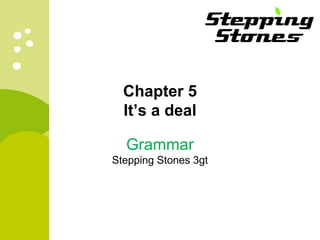Report
Share

Recommended
More Related Content
What's hot (19)
Similar to Can, could, to be able to
Similar to Can, could, to be able to (20)
[123doc] - giao-an-dien-tu-solution-elementary-powerpoint-unit-9.pptx![[123doc] - giao-an-dien-tu-solution-elementary-powerpoint-unit-9.pptx](data:image/gif;base64,R0lGODlhAQABAIAAAAAAAP///yH5BAEAAAAALAAAAAABAAEAAAIBRAA7)
![[123doc] - giao-an-dien-tu-solution-elementary-powerpoint-unit-9.pptx](data:image/gif;base64,R0lGODlhAQABAIAAAAAAAP///yH5BAEAAAAALAAAAAABAAEAAAIBRAA7)
[123doc] - giao-an-dien-tu-solution-elementary-powerpoint-unit-9.pptx
More from wendydej
More from wendydej (20)
Can, could, to be able to
- 1. Chapter 5 It’s a deal Grammar Stepping Stones 3gt
- 2. Can, could en to be able to Can en to be able to betekenen ‘kunnen’. • I can sing very well. • She can’t play tennis very well. • We are able to go out to dinner. • They aren’t able to tell us what’s wrong. De verleden tijd van can is could. • I could sing very well when I was young. • She couldn’t play tennis yesterday.
- 3. Can kun je alleen in de verleden tijd zetten (could). Voor alle andere tijden behalve de verleden tijd gebruik je dus een vorm van to be able to: • toekomende tijd: They will be able to pay us back. • present perfect: I haven’t been able to repair my bike.
- 4. Now show what you know! (kies het juiste antwoord) 1. I have other plans, so I won’t be able to / will be able to come to the party. 2. Why can’t / couldn’t he help us yesterday? 3. They aren’t able to / are able to drive. They both have driver’s licenses. 4. I can / am not able to walk 30 kilometres. It’s just way too far! 5. We haven’t been able to / can talk to her, because she never answers the phone. 6. Of course you can’t / are able to quit smoking! You just have to try harder.